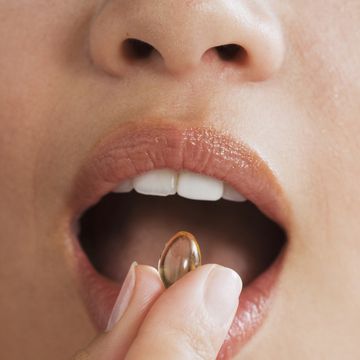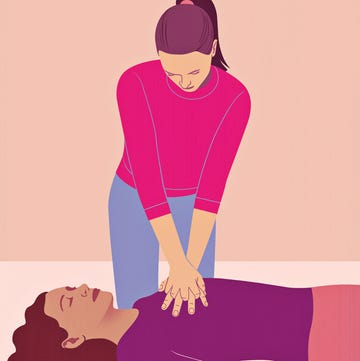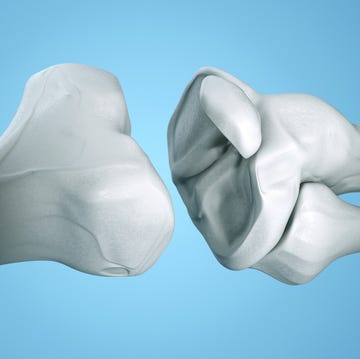Your body — and, specifically, your vagina — goes through changes throughout your life. That's especially true during menopause, when things can start to feel different down there.
Menopause causes your body's levels of the hormone estrogen to decrease, and that can affect your vagina and urinary tract, explains the American College of Obstetricians and Gynecologists (ACOG). Over time, your vaginal lining can get thinner, dryer, and less elastic.
This condition, called vaginal atrophy, impacts 45% of women, according to a study published in the Journal of Menopausal Medicine. Because of reduced vaginal blood flow and capacity for arousal and orgasm, vaginal atrophy can interfere with your ability to have pleasure during sex, says women's health expert Jessica Shepherd, M.D., an OB-GYN in Dallas, Texas.
The implications go beyond sex. "Vaginal atrophy can bother you even when you're just taking a walk," says Mary Jane Minkin, M.D., a clinical professor of obstetrics and gynecology and reproductive sciences at Yale Medical School.
It all sounds pretty awful, but the good news is that it's treatable. Here's the info you need about the condition, and how to get relief.
What are the symptoms of vaginal atrophy?
Every woman's experience is slightly different, Dr. Minkin says. In general, the ACOG says you may experience the following symptoms:
- Vaginal burning and itching
- Decreased lubrication during sex
- Bleeding after sex
- More frequent vaginal and urinary tract infections
- A frequent need to pee
The urinary symptoms may seem surprising, but vaginal atrophy also thins the lining of the bladder, Dr. Shepherd says, which opens women up to bladder infections.
How can vaginal atrophy affect my life?
Painful sex is one of the biggest issues, Dr. Minkin says. "The lack of lubrication can irritate the vaginal tissue, and friction from sex irritates it even more," she explains. The most frustrating part? Avoiding sex because it's painful can make the symptoms of vaginal atrophy worse. "It is a vicious cycle," Dr. Minkin says. "If you're not having sex, you do continue to get drier." Having sex on a regular basis increases blood flow to the vagina and may cause an increase in certain hormones that helps keep your vagina well-lubricated and elastic, Dr. Shepherd says.
Dryness alone can be a difficult thing to deal with, Dr. Minkin says. It can cause itchiness and burning while going about everyday life. "The cells in the vagina actually change," Dr. Minkin says. "They go from nice and plump to thinner, and that can cause uncomfortable symptoms."
Urinary changes can happen too. Feeling like you need to pee a lot and having to go immediately after you get the urge can make some women nervous about venturing too far from a bathroom, Dr. Minkin says.
How do you treat it?
Thankfully, there are many options to treat vaginal atrophy. Some are over-the-counter, others are prescribed by your gynecologist or doctor. According to the ACOG, treatments include:
Vaginal moisturizers and lubricants
These OTC products help relieve dryness and prevent painful sex and are typically available in drugstores.
Local estrogen therapy
A small dose of estrogen is released via a vaginal cream, ring, or dissolvable tablet directly into the vaginal tissue, where it helps restore the thickness and elasticity of the vaginal lining. These prescription treatments also help relieve dryness and irritation, Dr. Minkin says.
Systemic estrogen therapy
Take a pill, or apply a patch, gel, or spray to your skin, and estrogen is released into the bloodstream where it travels to organs and tissues that need more of the hormone.
Keep in mind it's important to take progestin when doing an estrogen therapy, according to the ACOG. Estrogen-only treatments — which are available by prescription — can increase the risk of cancer in the uterus lining, and progestin helps counter that. Estrogen makes cells in the lining of the uterus multiply and divide while progestins help shed that lining, Dr. Shepherd explains.
Selective estrogen receptor modulators
Also known as SERMs, this prescription medication binds to estrogen receptors that are located all over the body and can help stimulate production of the hormone.
When should I talk to my doctor about this?
Have the chat if you are nearing menopause (typically in your 40s and 50s), Dr. Shepherd says. "Vaginal atrophy should be a continuing discussion so that a woman knows what to expect, and as symptoms start to happen, they can be addressed," she says.
No matter your age, if your vagina feels uncomfortable or if you're dealing with painful sex, always bring it up with your provider, says Dr. Minkin. "This condition is easy to take care of."
Subscribe to Woman's Day today and get 73% off your first 12 issues. And while you’re at it, sign up for our FREE newsletter for even more of the Woman's Day content you want.













